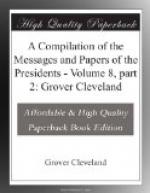The envoys have received another commission authorizing them to conclude with Russia a treaty of commerce with a view to strengthen the amicable relations and improve the beneficial intercourse between the two countries.
The issue of this friendly interposition of the Russian Emperor and this pacific manifestation on the part of the United States time only can decide. That the sentiments of Great Britain toward that Sovereign will have produced an acceptance of his offered mediation must be presumed. That no adequate motives exist to prefer a continuance of war with the United States to the terms on which they are willing to close it is certain. The British cabinet also must be sensible that, with respect to the important question of impressment, on which the war so essentially turns, a search for or seizure of British persons or property on board neutral vessels on the high seas is not a belligerent right derived from the law of nations, and it is obvious that no visit or search or use of force for any purpose on board the vessels of one independent power on the high seas can in war or peace be sanctioned by the laws or authority of another power. It is equally obvious that, for the purpose of preserving to each State its seafaring members, by excluding them from the vessels of the other, the mode heretofore proposed by the United States and now enacted by them as an article of municipal policy, can not for a moment be compared with the mode practiced by Great Britain without a conviction of its title to preference, inasmuch as the latter leaves the discrimination between the mariners of the two nations to officers exposed by unavoidable bias as well as by a defect of evidence to a wrong decision, under circumstances precluding for the most part the enforcement of controlling penalties, and where a wrong decision, besides the irreparable violation of the sacred rights of persons, might frustrate the plans and profits of entire voyages; whereas the mode assumed by the United States guards with studied fairness and efficacy against errors in such cases and avoids the effect of casual errors on the safety of navigation and the success of mercantile expeditions.




